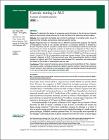| dc.contributor.author | MCLAUGHLIN, RUSSELL | |
| dc.contributor.author | HARDIMAN, ORLA | |
| dc.contributor.author | Vajda, Alice | |
| dc.contributor.author | Heverin, Mark | |
| dc.contributor.author | Thorpe, Owen | |
| dc.contributor.author | Abrahams, Sharon | |
| dc.contributor.author | Al-Chalabi, Ammar | |
| dc.date.accessioned | 2020-03-09T17:10:12Z | |
| dc.date.available | 2020-03-09T17:10:12Z | |
| dc.date.issued | 2017 | |
| dc.date.submitted | 2017 | en |
| dc.identifier.citation | Vajda, A., McLaughlin, R.L., Heverin, M., Thorpe, O., Abrahams, S., Al-Chalabi, A. & Hardiman, O., Genetic testing in ALS: A survey of current practices., Neurology, 88, 10, 2017, 991 - 999 | en |
| dc.identifier.other | Y | |
| dc.identifier.uri | https://n.neurology.org/content/88/10/991 | |
| dc.identifier.uri | http://hdl.handle.net/2262/91745 | |
| dc.description | PUBLISHED | en |
| dc.description.abstract | Objective: To determine the degree of consensus among clinicians on the clinical use of genetic
testing in amyotrophic lateral sclerosis (ALS) and the factors that determine decision-making.
Methods: ALS researchers worldwide were invited to participate in a detailed online survey to
determine their attitudes and practices relating to genetic testing.
Results: Responses from 167 clinicians from 21 different countries were analyzed. The majority
of respondents (73.3%) do not consider that there is a consensus definition of familial ALS
(FALS). Fifty-seven percent consider a family history of frontotemporal dementia and 48.5%
the presence of a known ALS genetic mutation as sufficient for a diagnosis of FALS. Most respondents
(90.2%) offer genetic testing to patients they define as having FALS and 49.4% to
patients with sporadic ALS. Four main genes (SOD1, C9orf72, TARDBP, and FUS) are commonly
tested. A total of 55.2% of respondents would seek genetic testing if they had personally
received a diagnosis of ALS. Forty-two percent never offer presymptomatic testing to family
members of patients with FALS. Responses varied between ALS specialists and nonspecialists
and based on the number of new patients seen per year.
Conclusions: There is a lack of consensus among clinicians as to the definition of FALS. Substantial
variation exists in attitude and practices related to genetic testing of patients and presymptomatic
testing of their relatives across geographic regions and between experienced specialists
in ALS and nonspecialists. | en |
| dc.format.extent | 991 | en |
| dc.format.extent | 999 | en |
| dc.language.iso | en | en |
| dc.relation.ispartofseries | Neurology; | |
| dc.relation.ispartofseries | 88; | |
| dc.relation.ispartofseries | 10; | |
| dc.rights | Y | en |
| dc.subject | Amyotrophic lateral sclerosis (ALS) | en |
| dc.subject | Frontotemporal dementia (FTD) | en |
| dc.subject | Medical care | en |
| dc.title | Genetic testing in ALS: A survey of current practices | en |
| dc.type | Journal Article | en |
| dc.type.supercollection | scholarly_publications | en |
| dc.type.supercollection | refereed_publications | en |
| dc.identifier.peoplefinderurl | http://people.tcd.ie/hardimao | |
| dc.identifier.peoplefinderurl | http://people.tcd.ie/mclaugr1 | |
| dc.identifier.rssinternalid | 157141 | |
| dc.identifier.doi | http://doi.org/10.1212/WNL.0000000000003686 | |
| dc.rights.ecaccessrights | openAccess | |
| dc.identifier.orcid_id | 0000-0003-2610-1291 | |




